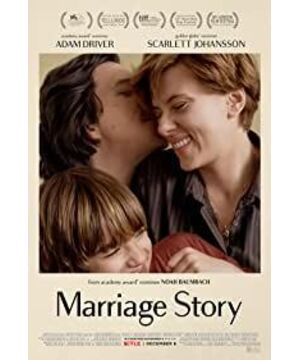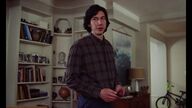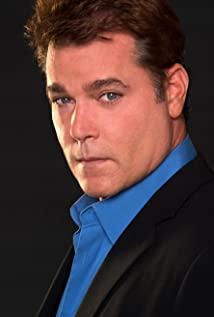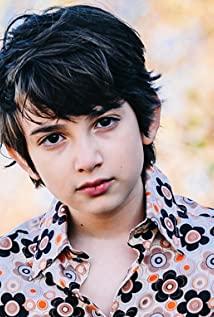Aiming to become a big Hollywood player, Netflix made a powerful two-hit combo at the end of the year: "The Irishman" launched at the end of November, and "Marriage Story" launched in early December. Phenomenal discussion. This may be something that only Netflix can achieve. If these two films are premiered in theaters, they are likely to be overwhelmed by special effects blockbusters and reduced to a small group of intellectuals and veteran fans.
Today, "Marriage Story" itself has almost been chewed through. Whether it's the wrestling between the sexes, the love-hate relationship in every marriage, or the brilliant performances of Adam Driver and Scarlett Johansson, they've been analyzed countless times. But as a representative of a new generation of New York intellectual directors, Noah Baumbach's growth background, life experience and knowledge reserve provide the context for "Marriage Story", which has not been mentioned too much. Perhaps, the context of this work and its director in many contexts can allow us to see more fresh things.
Mike Nichols + Woody Allen + "Whispering Core": New York Film Collection Masterpieces
Many people first learned about Baumbach, perhaps through Wes Anderson: The latter's "Life in the Water" (2004) and "Fantastic Daddy Fox" (2009), both co-written by Anderson and Baumbach . Anderson, in turn, fueled Baumbach's career breakthrough: he was the producer of Baumbach's "The Squid and the Whale" (2005), the film that gave Baumbach his place as a director in Hollywood up the heel.
Indeed, Baumbach’s and Anderson’s early works have many similarities: both focus their stories on the discreet charm of middle-class families in front of people, and the bitterness behind them (see “Genius” and “Squid and Whale” for details). But compared with Anderson, who was born in Houston, Baumbach came from a more intellectual New York family: his father was a novelist and film critic, and his mother was a writer for the New York alternative magazine The Village Voice. His parents' home in Brooklyn was the location for The Graduate director Mike Nichols' 1980s film "Heartfire." With such a background of growth, it seems that Baumbach's works will be more intellectually introspective.
After Woody Allen's limelight faded, Baumbach has become the face of New York intellectual cinema. People often compare "Marriage Story" with "The Kramers", but "Marriage Story" is also a legacy of "Annie Hall": two talented young people who love each other, but because of one heart New York, with a heart to Los Angeles, had to part ways. At the end of the two films, a song is used to express the nostalgia and sigh of the lost love: "Seems Like Old Times" sung by Diane Keaton in "Annie Hall", and "Marriage Story" "Being Alive" by Adam Driver.
The exploration of intimacy, the tragic tones, the love of New York, and the brilliant presentation of star glamour are all Baumbach's inheritance of Woody Allen. But Baumbach's movie recipe doesn't stop there. While Woody's films are good at defuse pain with humor and wit, Baumbach's films are willing to look directly at the pain and embarrassment of life, even if they stab you in the eye. We can recognize Baumbach's unique style from the scenes in "Marriage Story" where the wife asks her friend to file the divorce papers with her husband, and when the husband tries to maintain the appearance of a good family life under the supervision of family observers: he Extremely patiently set aside time for the scene, letting the relationship between the characters and the dramatic atmosphere develop freely over time, sprawling out unexpected branches, and finally making everything painful and helpless. The nervousness of Scarlett's sister in the previous scene, and the clumsiness and panic of Driver under the scrutiny of observers in the latter scene add an unexpected sense of humor to the scene. However, at the end of the scene, Baumbach revealed the bloody truth: in the previous scene, the couple's normal life appearance was completely dispelled by a piece of paper; He was exhausted in the divorce war, and he was completely knocked down by life.
Baumbach's aforementioned qualities are reminiscent of two other New York film traditions. The capture of pain and desperation in intimacy reminds us of the Mike Nichols-esque Pan-Broadway tradition mentioned earlier, especially his classic "Small Night". And the exquisite capture of the trivial details of daily life reminds us of the "Mumblecore" film tradition that also locks the perspective on the trivialities of life. This New York independent film genre, which originated in the early 21st century, does not emphasize drama, but focuses on the subtle fluctuations of character emotions and scene atmosphere. And one of the important representatives of the "Whispering Core" movie is Baumbach's current lover Greta Gerwig. As a result, the triple influence from Woody Allen, Nichols and "Whispering Core" makes Baumbach, in a sense, a master of New York movies and the most typical New York knowledge of the moment. Molecular Shadowman.
The technical stream director of the literary film world
But if you think Baumbach is a typical "liberal" director because of his inheritance of New York's intellectual temperament, you'd be wrong. In fact, Baumbach's most obsessive movie icon is Scarface and Mission: Impossible 1 director Brian De Palma, a man known for his cinematic technique rather than textual expression." "Science Students" director. Baumbach even made a documentary in 2015 to express his reverence for De Palma. Like De Palma, he emphasizes technique.
For Baumbach, making a film is a technically demanding task. The dialogue between Driver and Scarlett in the film is so natural that we almost think it's from improvisation, but in fact, even every punctuation and pause, they are strictly executed according to the script, in a natural state It is made by grinding again and again.
Baumbach is also quite conscious of the external form of his work: "Marriage Story" uses a retro 1.66:1 aspect ratio, because Baumbach wants to be in the character's inner world and their surroundings. balance between the external environment. Baumbach learned from Bergman's films that close-ups are the best way to show a character's heart, and that 1.33:1 is the best ratio for a close-up of a character's face. At the same time, the urban environment of New York and Los Angeles, the claustrophobic space in which the two go to court, is also an integral part of the film. On balance, Baumbach made a compromise and "retro" choice.
Baumbach is so self-conscious about technology that the script for "Marriage Story" sometimes seems overly chiseled. The "sweet love letter" that the husband and wife wrote to each other at the opening was revealed to be the other's advantages that the two were forced to write under the advice of the marriage mediator under the reversal of the play; The passage will also reappear near the end of the film. It brings shocks to the audience time and time again, but this shock comes more from the technical layout than from the emotion itself. The same situation also appears in various echoing details in the film: Driver closed the cabinet that Scarlett forgot to close during the quarrel, and Scarlett still proposed to cut for Driver when the divorce lawsuit was raging. Hair... These details are sour, but what moves us may only be the screenwriting skills themselves.
It's a marriage story, not a love story
"Marriage Story" is a deeply personal work, even if it's a bit overly technical, because, in 2013, Baumbach himself went through a divorce. He was married to actor Jennifer Jason Leigh for eight years, though the two were separated for the last three years, and for the last two Baumbach has officially become lovers with Greta Gerwig. The hero and heroine of "Marriage Story" have a son, and Baumbach and Jason Lee also have a son; and their marriage is also a combination of New Yorker and Los Angeles, although Baumbach claims that, except for these details , Nothing about Marriage Story is an autobiographical restoration of his marriage to Jason Lee.
We don't know the inside story of Baumbach's marriage, but one thing is clear: First-hand experience of the divorce process enriches the text of Marriage Story. In fact, in the author's opinion, several scenes with divorce lawyers appearing are the most exciting scenes in the whole film. They not only reveal to the audience the social system that allows divorce proceedings to work, and create three distinct but distinct images of lawyers, they also dedicate the most unforgettable phrase in the film: "Criminal lawyers will see the worst of bad guys. On the bright side, divorce lawyers will see the worst side of good people"; "Society has always taken the absence of fathers for granted, because God is absent, and he doesn't even have sex!"
However, when we examine the emotional relationship in the film itself, we will find that what the wife said may be right: the husband has never really loved her, or at the very least, the husband's love for his wife is far less than the wife's love for her husband. . After the two broke up, Driver's character's singing in the bar should have been the most moving part of the film. In the lyrics, however, all we hear about his nostalgia for married life is that his wife awakens his long-lost senses for him and shares with him all those experiences that should have been savored by him alone. In the end, the husband misses his wife only because his wife makes him feel "Being Alive" more. And this nostalgia is undoubtedly selfish in nature. This is really just a marriage story, not a love story.
2019.12.15/Originally published in "Southern People Weekly"
View more about Marriage Story reviews











